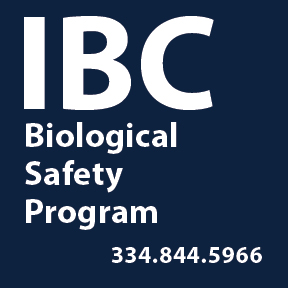Biological Safety Program (IBC)
|
The Biological Safety Program at Auburn University provides guidance and assistance for faculty, staff, and students on issues related to the use of biohazardous materials in teaching, research, and related activities. The goal of the program is to minimize the risks associated with the use and maintenance of biohazardous materials; maintain a safe and healthy work environment; and guard against the release of biohazardous materials that may harm humans, animals, plants or the environment. Administrative components of the Biological Safety Program include the Office of Research Integrity & Compliance, the Department of Risk Management and Safety, and the Institutional Biosafety Committee. The Office of Research Integrity & Compliance (ORIC) provides oversight, independently and in conjunction, with the Auburn University Compliance Committees for research and related activities under the authority of the Vice President for Research. In relation to the Biological Safety Program, the ORIC provides administrative support to the Institutional Biosafety Committee (IBC); assists investigators with questions concerning the submission of Biological Use Authorizations; develops and disseminates educational materials related to IBC activities; and prepares and submits internal and external reports related to IBC activities. The Department of Risk Management and Safety (RMS) provides subject matter experts in all areas of safety, including biological, chemical, radiological, occupational, and general laboratory safety. RMS supports Auburn University’s scientific community by providing training, conducting laboratory inspections, consulting on laboratory design, participating in review of Biological Use Authorizations, and providing technical advice. Auburn University’s Biological Safety Officer reports to RMS, is a continuing member of the IBC, and is the technical point of contact for all biological safety issues. The Institutional Biosafety Committee reviews and approves the use of all Risk Group 1 or higher biohazardous agents, all experiments involving human gene therapy, formation of transgenic animals or plants, and the generation and/or use of rDNA (as defined by the NIH Guidelines) to ensure compliance with applicable regulations and institutional policies. |

540 Devall Drive, Suite 200
Auburn, AL 36832
Phone: 334.844.5909
Fax: 334.844.4391


